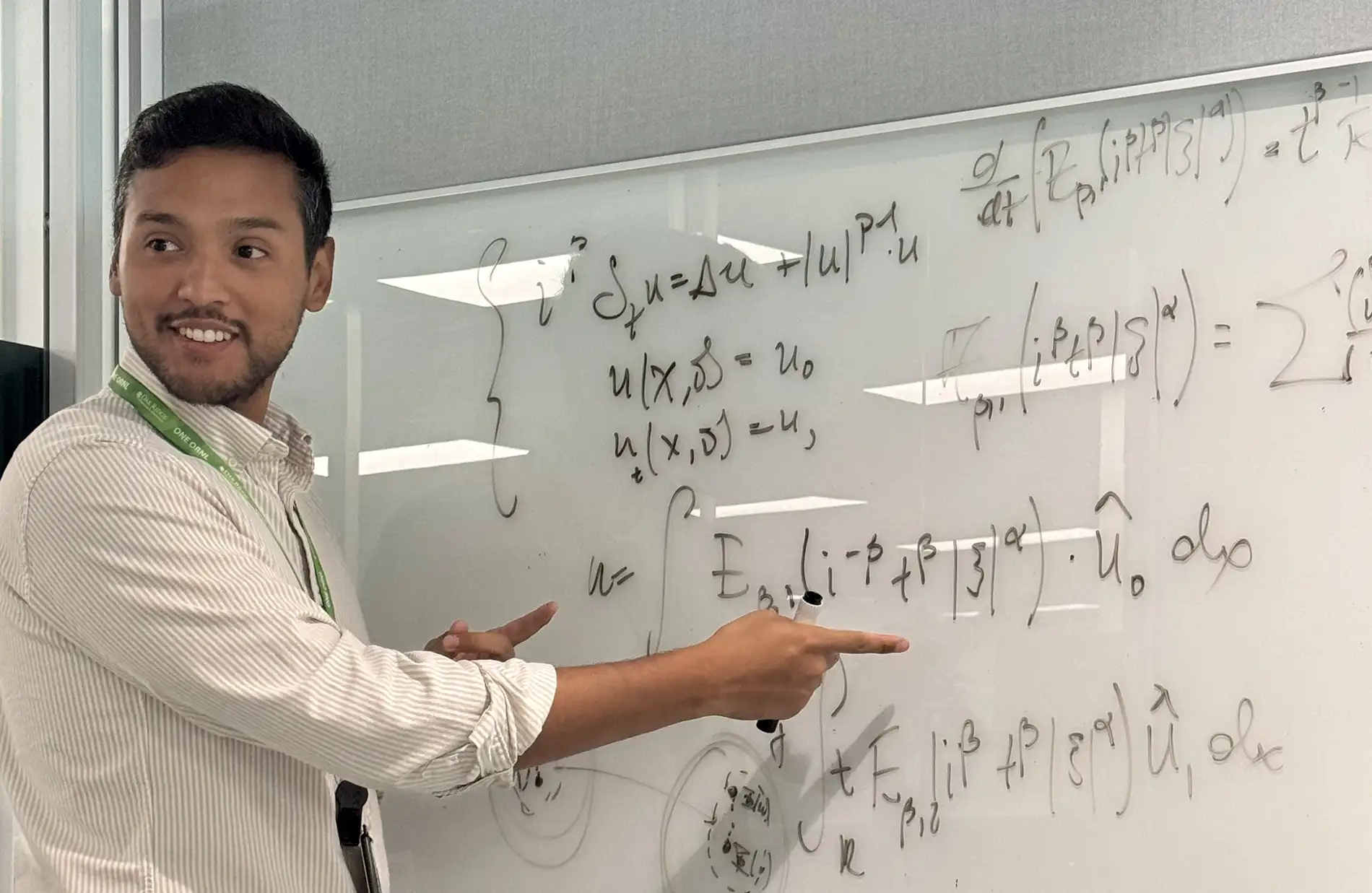Mathematician’s research aims to secure clean energy for society
Meet Luis Caicedo Torres

Luis Caicedo Torres, Ph.D., hopes to leverage tools from mathematics to create a world with sustainable energy for everyday uses. (Photo Credit: Luis Caicedo Torres)
Growing up, Luis Caicedo Torres, Ph.D., got a sense of joy and completeness when putting together puzzles. Like puzzles, mathematics allowed Luis to see how the different pieces of a puzzle fit together to make a complete mosaic. As he continued to study mathematics, the puzzles became more intricate and solving the problems became harder, but the pieces coming together to create a picture kept him motivated. Along with supporters like his parents, professors, advisors and high school teachers, pursuing a doctoral degree in mathematics at Florida International University was a no brainer. After hearing about the National Nuclear Security Administration Minority Serving Institutions Internship Program (NNSA-MSIIP) with the Oak Ridge Institute for Science and Education (ORISE) from his advisor, Ciprian Gal, Ph.D., he was encouraged to apply for the lab environment and ability to engage on different types of problems. He participated under the mentorship of Noel Nelson, Ph.D., and was placed within the Systems Analysis and Optimization group under the Advanced Reactors Engineering and Development Section of the Oak Ridge National Laboratory (ORNL) Nuclear Energy and Fuel Cycle Division.
The NNSA-MSIIP provides paid opportunities for undergraduate and graduate students at Minority Serving Institutions pursuing degrees in critical science, engineering, technology, mathematics and other disciplines that support the current and future missions of the NNSA. Luis’ research looks at understanding how scientific machine learning can be used for surrogate modeling in nuclear engineering applications. The goal is to understand how artificial intelligence (AI) tools can be used to improve our understanding and modeling of the inner workings of nuclear reactors or nuclear phenomena. With the findings, the team hopes to use the models for the design and optimization of nuclear reactors and anomaly detection for nuclear fuel objects.
“Currently, physics-informed neural networks, a type of scientific machine learning algorithm which focuses on optimization around a particular partial differential equation, can approximate a solution on a training set very well for linear systems,” he said. “Our current efforts are seeking to use additional physical properties of systems as constraints for the AI model to ‘learn from’ to improve their performance outside its training set, normally referred to as the extrapolation regime. This can then be extended for use in nonlinear phenomena that we see in experimental data.”
Additionally, his research aims to apply the idea to nonlocal-type equations because of their popularity and vast applicability in the physical sciences. The closer science can get to understanding the various aspects of nuclear reactors, the closer society can bring ample clean energy to gain energy independence and strengthen energy infrastructure as a nation.
“An idealistic vision of the future for me is one where nuclear energy is common and trusted as a sustainable energy source to power our homes, cars and really, our whole lives in a way that will not harm us and our planet,” he said. “I believe we can leverage the tools from mathematics to achieve this end. It’s all one big new puzzle for me.”
A typical day for Luis usually consists of staying up to date on news at the lab through ORNL today and major science headlines on science magazines like Quanta and YouTube. Luis then moves on to reading papers, coding up and testing his ideas for projects and documenting the progress. If time permits, Luis will attend seminars held at the lab to learn and engage in discussion about new and exciting knowledge.
“I’ve gained knowledge in nuclear science, a field that is not my field of training, and have really come to appreciate the advancements and aspirations of the field since the Manhattan project,” Luis said. “I’ve gained experience in machine learning, high performance computing, mathematical modeling and general coding.”
With his participation in the program being the first exposure to a lab environment for Luis, he believes that the experience provided a new perspective on his career goals. The program allowed for Luis to discover that the lab environment is a great fit for him and the perfect way for him to apply his degree.
“I am thankful to the National Nuclear Security Administration’s Minority Serving Institutions Internship Program for being the bridge between me and a place like ORNL,” he said. “The program managers and support team are helpful and encouraging and I know they will keep doing great things for other students in the future.”
Upon completion of his appointment, Luis plans to secure a postdoctoral research associate position at ORNL to continue learning from scientists and others at the lab. In the meantime, Luis enjoys being outdoors and finding new coffee shops with Cuban coffee to read or catch up with friends.
“My family immigrated to the United States after the beginning of the political situation seen today in Venezuela and I experienced firsthand how poor management of resources by government can lead to the total collapse of society for its citizens,” Luis said. “I feel like my interest and research in nuclear energy science can be one piece of the puzzle to help this country develop its nuclear energy infrastructure and avoid being energy dependent or even worse, an energy crisis.”
The NNSA-MSIIP Program is funded by NNSA and administered through the U.S. Department of Energy’s (DOE) Oak Ridge Institute for Science and Education (ORISE). ORISE is managed for DOE by ORAU.

